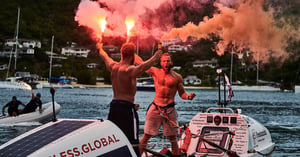Max talks us through his incredible journey in a little row boat, how he managed to go full steam ahead after his first failed attempt to cross the Atlantic, and what he learnt along the way
Could you handle living on a tiny boat, in the middle of the Atlantic, seasick and sleep deprived, rowing 2 hours on, 2 hours off, everyday for 37 days?
Yeah, us neither.
But that’s exactly what Max Thorpe did (twice, no less) to become the winner of the Talisker Atlantic row, crossing 3,000 miles of the Atlantic from San Sebastian to Antigua, in a new world record time.
Oh, and did we mention, he did all this after he was nearly crushed to death by an oil tanker?
Ignorance is bliss
Max admits that he’d never really rowed before deciding to take on the 3,000 mile Atlantic challenge.
“You know, I was riding a wave of blissful ignorance at that point, I think. And as soon as I saw the challenge, I saw a few photos of a couple of people that had completed it and [were] at the finish line, and I was thinking about how I would feel after that journey, crossing the finish line with an achievement like that. It didn’t take me long to be completely hooked on the idea. It was pretty much an overnight decision that I was going to make this my target for the coming months and years… But I think the first actual trip out on a boat must have been about six months to a year after that initial decision was made.”
Preparation, preparation, preparation
So, having never really been in a little row boat, Max set out on his quest to achieve this incredible feat. What he soon learned was the amount of intense preparation it took in terms of training, nutrition, equipment and mental strength, just to make it to the starting line in San Sebastian.
”This is a sport that is very young. And so, there is room and space for innovation across the board. And I think for me, one of the things that I wanted to do, in order to gain an edge in this race in this challenge was to be the fittest, strongest and most conditioned individual for this type of event. So I don’t think I underestimated it. If anything, I knew that that was something so within my control, that I would do everything I could to be physically prepared. And I do believe that I achieved that.”
All is not swell
So in 2017, Max set out on what would be his first attempt. The attempt that nearly cost him and his teammate, Chris, their lives.
Nine days and only 645 miles in, Max and Chris found themselves hit by bad weather. They were obliterated by a storm, which capsized their boat, caused it to catch fire and destroyed any back-up plans.
They were quite literally lost at sea.
“I think it was a powerful few hours that will obviously stay with me forever.That ability to kind of shift focus to ‘Okay, forget Antigua, that’s no longer a thing’, and acceptance, which was really difficult actually, acceptance that our race was over [which] was a really difficult moment, considering everything that we had invested into this challenge. As Skipper, it’s up to me to make that final call, whether our race is over and what the decision is. And I made that call. It was very tough.”
“One of those things that threw this all into even more uncertainty was at that point, pretty much exactly as we were facing the fire. The sea just changed again. It just went up a notch. We were being kind of rear-ended by these enormous, enormous waves – like truly breathtaking waves. It’s almost impossible to describe to someone that hasn’t been in waves this big, but we’re talking waves up to around 15 meters in height. It really is kind of extraordinary, the power of the ocean in these conditions. Things took a turn for the worse, and we realized that we weren’t really [just] in danger here -we were fighting for our lives…”
Listen to the full story on how Max nearly collided with an oil tanker and survived to tell the tale, as well as his successful second attempt and the lessons he learned about nutrition, sleep deprivation and mental resilience, on the Dialogue app. Not on Dialogue? Find out more about Health and Wellness Software solutions.




 Canada (EN)
Canada (EN)
 Global (EN)
Global (EN)
